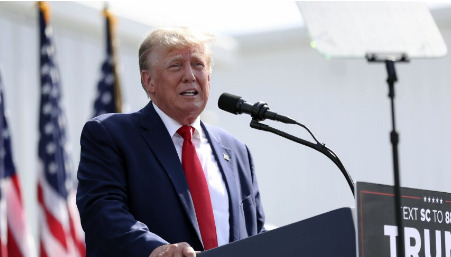#DemocracyDebate
Text
California Secretary of State Stands Firm: Donald Trump's Name to Remain on Primary Ballot Despite Disqualification Requests

California Secretary of State Stands Firm: Donald Trump's Name to Remain on Primary Ballot Despite Disqualification Requests
Live Watch
Introduction:
In a surprising turn of events, California's Secretary of State has made a resolute decision to retain Donald Trump's name on the primary ballot despite mounting requests for disqualification. This decision has sparked heated debates and raised questions about the role of election officials in ensuring fair and transparent electoral processes. In this article, we delve into the details surrounding this controversial decision and explore its implications for the upcoming primary in California.
The Background:
The controversy began when several individuals and groups submitted formal requests to the California Secretary of State, urging the removal of Donald Trump's name from the primary ballot. Citing concerns ranging from alleged violations of election laws to ethical considerations, these requests prompted a thorough examination of the situation.
Secretary of State's Response:
California's Secretary of State, known for overseeing the state's electoral processes, has unequivocally defended the decision to keep Trump's name on the ballot. In a press statement, the Secretary emphasized the importance of upholding democratic principles and respecting the rights of candidates and voters. The decision to maintain Trump's candidacy on the ballot reflects a commitment to fair play, allowing voters to make informed choices without interference.
Legal and Ethical Considerations:
The decision raises pertinent legal and ethical questions about the authority of election officials and the criteria for disqualifying a candidate. While election laws are in place to ensure fair and transparent elections, determining the validity of disqualification requests requires a careful examination of evidence and adherence to due process. The Secretary of State's office, in justifying its decision, highlighted the need for concrete evidence and adherence to established legal procedures.
Public Reaction and Political Fallout:
Unsurprisingly, the decision has not gone unnoticed, with reactions pouring in from various quarters. Supporters of the former president hail the decision as a victory for democracy and an affirmation of the right of every citizen to participate in the electoral process. However, critics argue that the decision sets a dangerous precedent, potentially allowing candidates with controversial backgrounds to participate in elections without facing consequences for alleged wrongdoings.
The controversy has also spilled over into the political arena, with opposing parties using the situation to score points against each other. As the news spreads, it becomes a focal point in political discourse, influencing public opinion and potentially shaping the narrative in the upcoming primary.
The Future Implications:
The decision by the California Secretary of State is not isolated, and its repercussions are likely to extend beyond the state's borders. The precedent set in this case could influence similar situations in other states and prompt a reevaluation of the criteria for disqualifying candidates. It also highlights the delicate balance between maintaining the integrity of elections and respecting the democratic right of individuals to participate.
Conclusion:
As California gears up for its primary elections, the decision to retain Donald Trump's name on the ballot remains a contentious issue. The legal, ethical, and political dimensions of this decision underscore the complexities inherent in the electoral process. As the situation unfolds, it will undoubtedly continue to be a focal point of discussions on the role of election officials and the principles that underpin democratic governance.
#CaliforniaElectionStandoff#TrumpOnPrimaryBallot#DemocracyDebate#ElectionIntegrity#SecretaryOfStateDecision#PoliticalControversy#VoteRights#DisqualificationRequests#Trump2023#CaliforniaPrimary#ElectoralTransparency#LegalEthics#PoliticalDrama#VoterChoices#DemocraticProcess
0 notes
Text
The paradox of democracy: Are Elections Bad for Democracy?
Democracy is widely regarded as the most desirable form of government, ensuring citizen participation and safeguarding individual rights. Central to the democratic process is the concept of elections, which provide a platform for citizens to choose their representatives. However, amidst the complexities of modern politics, it is worth exploring whether elections, despite their fundamental role, can have adverse effects on democracy itself. One argument against elections is that they may lead to limited representation and elitism in the political system. Elections often favor candidates with greater financial resources and established connections, disadvantaging individuals from marginalized communities or those lacking access to networks of power. Another argument is that elections often foster polarization and divisiveness within society. Political campaigns tend to rely on contrasting narratives and strategies that highlight differences between candidates and their supporters. Last but not the least, elections typically operate within fixed time frames, which can incentivize politicians to prioritize short-term gains over long-term, sustainable policies. While elections form the bedrock of democratic systems, it is crucial to critically assess their potential drawbacks. By implementing reforms that enhance representation, encourage long-term planning, reduce polarization, and strengthen citizen engagement, we can bolster the democratic process and ensure that elections truly serve as a cornerstone of a healthy and inclusive society. Democracy is an ongoing endeavor, and it requires our collective effort to nurture and uphold its ideals.
2 notes
·
View notes